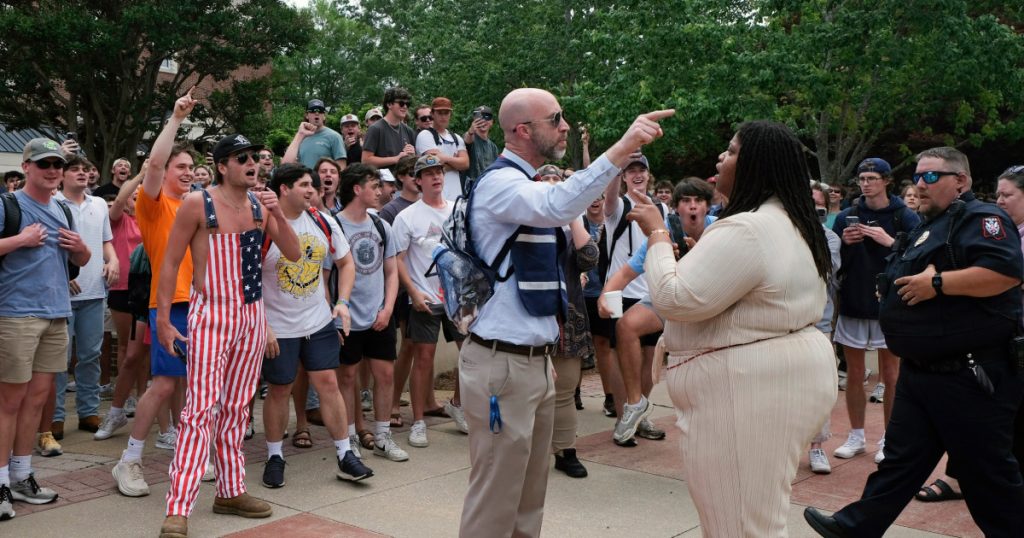The University of Mississippi is conducting a student conduct investigation after videos of pro-Palestinian protesters being surrounded by counter protesters, some of whom exhibited racist behavior, circulated online. Chancellor Glenn F. Boyce sent a letter to students and staff stating that the university was aware of offensive and unacceptable actions during the protest, including hostile and racist behavior. While student privacy laws prevent specific comments on individuals, one student conduct investigation has been opened, with the possibility of more cases to follow. The event, which took place on the campus Quad, involved approximately 30 to 60 pro-Palestinian demonstrators being outnumbered by counter protesters, some of whom sang “The Star-Spangled Banner” to drown out the protesters.
One particular incident at the protest drew widespread offense, in which a Black female graduate student on the protest side of a barricade was taunted by counter protesters. In a widely-shared video, a man can be seen making gestures and noises simulating an ape towards the woman, while others shouted offensive remarks. The university’s Black Student Union issued a statement in support of the pro-Palestinian demonstrators, describing them as nonviolent advocates for Palestine who were exercising their First Amendment rights. Commenters online condemned the incident, linking it to the state’s history of racial animus and violence, including efforts in the past to send all Black people back to Africa and riots against the admission of Black students in 1962.
The incident at the University of Mississippi highlights the ongoing racial tensions and history of discrimination in the state, despite its diverse population. The university, located in a state with a large Black population, has a student body that is only 11.4 percent Black. Chancellor Boyce’s message emphasized the importance of free speech and peaceful assembly, but also condemned behaviors that demean individuals based on race or ethnicity as being contrary to the school’s values. He acknowledged the challenging history of the state and the university, stating that incidents like the protest can set back progress. The university has opened a student conduct investigation to address the offensive and unacceptable behavior witnessed at the protest, with a focus on determining whether further actions are warranted.
The racist overtones of the incident at the University of Mississippi have sparked condemnation online, with many linking it to the state’s history of racial discrimination. The video of the protest circulated widely, drawing attention to the offensive behavior displayed by some of the counter protesters towards the pro-Palestinian demonstrators. The Black Student Union expressed solidarity with the protesters, highlighting their nonviolent advocacy for Palestine and the malicious intent of the counter protesters. The incident serves as a reminder of the continued challenges and divisions present in Mississippi, despite efforts to promote diversity and inclusion on campus. The university is working to address the issue through a student conduct investigation and by reaffirming its commitment to free speech, peaceful assembly, and respect for all individuals, regardless of race or ethnicity.
The protest at the University of Mississippi underscores the need for ongoing dialogue and education to address racial tensions and promote understanding and unity on campus. The incident has brought to light the complexities of free speech and the importance of safeguarding individuals from discrimination based on race or ethnicity. Chancellor Boyce’s response to the incident reflects a commitment to addressing the behavior that goes against the school’s values and history. By acknowledging the challenging history of the state and university, the university can work towards creating a more inclusive and respectful environment for all students and staff. Moving forward, it will be important for the university to continue addressing issues of racial discrimination and fostering a culture of acceptance and diversity on campus.


